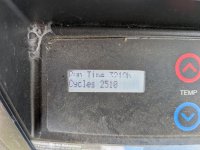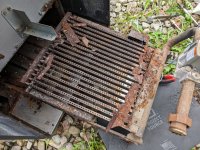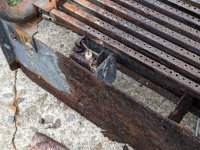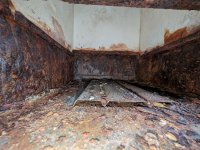Heater not lighting, pulled out the burner tray to see what's up and everything is crumbling from the rust. No active leaks that I can see. Wondering if others have had this happen. Photos attached.
Is this normal corrosion for a 4 year old Raypak heater?
- Thread starter robwas
- Start date
You are using an out of date browser. It may not display this or other websites correctly.
You should upgrade or use an alternative browser.
You should upgrade or use an alternative browser.
- Jul 21, 2013
- 65,585
- Pool Size
- 35000
- Surface
- Plaster
- Chlorine
- Salt Water Generator
- SWG Type
- Pentair Intellichlor IC-60
Yup, lots of folks see the natural draft Raypak heaters rust out that way.
That is why every heater manufacturer now has sealed burner forced draft design, including Raypak with their Avia heater.
Look at replacing it with a Pentair MasterTemp, Starite Max-E-Therm, or Raypak Avia.
That is why every heater manufacturer now has sealed burner forced draft design, including Raypak with their Avia heater.
Look at replacing it with a Pentair MasterTemp, Starite Max-E-Therm, or Raypak Avia.
Thanks for the quick reply. I guess it's from condensation and lower grade metals, we're in central NJ. What bugs me is I've worked on ancient Hayward comfortzones, Anthony heaters, Laars etc with the same natural draft design and they were 20 years old, still looked brand new new inside. I guess nothing is made like it used to beYup, lots of folks see the natural draft Raypak heaters rust out that way.
That is why every heater manufacturer now has sealed burner forced draft design, including Raypak with their Avia heater.
Look at replacing it with a Pentair MasterTemp, Starite Max-E-Therm, or Raypak Avia.
- Jul 21, 2013
- 65,585
- Pool Size
- 35000
- Surface
- Plaster
- Chlorine
- Salt Water Generator
- SWG Type
- Pentair Intellichlor IC-60
Not normal, even in New Jersey.Heater not lighting, pulled out the burner tray to see what's up and everything is crumbling from the rust. No active leaks that I can see. Wondering if others have had this happen. Photos attached.
It took a lot of water to do that over a long time. Completely normal when there is a lot of water intrusion into the combustion chamber, as a roof overhead with no gutter. Saw that kill a heater in 1 year after I warned the customer as it had also ruined the heater I was replacing.
Or sprinklers, or a large amount of trees that allow a lot of rainwater to fall onto the heater. With a pH of 7 or less its not so good for equipment.
Or there was/is a tablet feeder in the line that caused damage to the heat exchanger which then leaked, which is my guess at that kind and extent of damage.
Or its a vinyl/fiberglass pool that the pH and alkalinity got way out of recommended levels. Had that combination on an install about 4 years ago. Removed the feeder, customer had it replaced. Never even looked at the pool as I was just there to install the heater. It was a Max-E-Therm. Didn't last 6 months.
Pool water is even worse than rainwater when it gets into a heater. You couple that with the heat inside a heater and even the stainless steel, that most of what is damaged is made from, doesn't stand a chance.
With improper care or maintenance, you can kill any equipment. Not placing blame, just the facts.
Just did one 2 weeks back. The burner tray looked similar but the rest of the heater base looked almost new. Had it looked like that I would have said, where's that credit card again 
No tablets, salt water pool. Wondering if there was a leak at some point before us that did the damage. I looked closely for leaks in the heat ex changer, manifolds, etc and everything was dry but the internals rusted really badly as you saw in the photos.Not normal, even in New Jersey.
It took a lot of water to do that over a long time. Completely normal when there is a lot of water intrusion into the combustion chamber, as a roof overhead with no gutter. Saw that kill a heater in 1 year after I warned the customer as it had also ruined the heater I was replacing.
Or sprinklers, or a large amount of trees that allow a lot of rainwater to fall onto the heater. With a pH of 7 or less its not so good for equipment.
Or there was/is a tablet feeder in the line that caused damage to the heat exchanger which then leaked, which is my guess at that kind and extent of damage.
Or its a vinyl/fiberglass pool that the pH and alkalinity got way out of recommended levels. Had that combination on an install about 4 years ago. Removed the feeder, customer had it replaced. Never even looked at the pool as I was just there to install the heater. It was a Max-E-Therm. Didn't last 6 months.
Pool water is even worse than rainwater when it gets into a heater. You couple that with the heat inside a heater and even the stainless steel, that most of what is damaged is made from, doesn't stand a chance.
With improper care or maintenance, you can kill any equipment. Not placing blame, just the facts.
Thread Status
Hello , This thread has been inactive for over 60 days. New postings here are unlikely to be seen or responded to by other members. For better visibility, consider Starting A New Thread.





